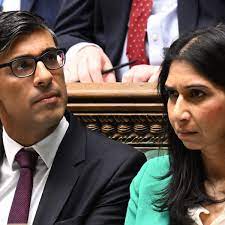Rafael Behr
Conservative leaders fail in one of two ways. Either they resist the demands of their most fanatical MPs or they don’t. Ignoring the zealots provokes rebellion, making the party unmanageable. Indulging them leads to policies that are unworkable. Rishi Sunak is combining both mistakes. The prime minister is giving the right of his party most of what it wants, which is not enough. Everything would not be enough.
Britain has left the European Union on terms more drastic than anything promised by the leave campaign, but the demand for separation is unsatisfied. Euroscepticism is an itch that spreads faster than every effort to scratch it. And so Sunak flies to Reykjavík this week for a summit of the Council of Europe to explain to the president of the European court of human rights (not an EU institution) why the rules must be changed so Britain can deport refugees to Rwanda. The Brexit promise was that control of the border would be taken back. From whom? Bureaucrats in Brussels first. Still the frontier is porous. Attention turns to judges in Strasbourg whose overreaching fingers must be peeled off national sovereignty. But meddlesome foreigners never act alone. The quest for control inevitably turns inward. It becomes a pursuit of fifth columnists and a cleansing of unsound minds in the culture. The trajectory is intrinsic to a doctrine that the Tory right embraced before daring to name it – nationalism.
Many Eurosceptics are still squeamish about the label. Some recognise the brand limitations of a word that comes historically associated with autocracy and war. Others insist that Brexit is a project for the advancement of free trade and therefore liberal, from a certain angle. In that view, the pattern of xenophobic rhetoric – the Brexit campaign posters depicting dark-skinned interlopers massing at the border; Home Office ministers warning against invading hordes – is a figment of the hysterical remainer imagination. The pretence got harder to sustain this week. Leading figures on the Tory right have mustered for a “National Conservatism” jamboree. They swapped laments about falling birthrates, subjugation by globalised elites and the demoralisation of youth by godlessness and Marxism. The home secretary, Suella Braverman, rehearsed her next bid for the Tory leadership, complaining about the unchecked advance of multiculturalism and calling for British workers to fill vacancies where migrant workers are in short supply. That is a swerve away from government policy, which is quietly more permissive of legal immigration, by way of work visas, while noisily hostile to anyone who turns up uninvited. Jeremy Hunt, the chancellor, understands that a tight labour market is constraining economic growth. So does Sunak, but he won’t say it aloud. The prime minister’s spokesperson rejected any suggestion that Braverman was freelancing, or that the cabinet is divided on migration matters.
The text of her speech was cleared by Downing Street. That doesn’t mean it was welcome. But nor should it be assumed that Sunak stifles liberal qualms when issuing licences to bang the hard right drum. The prime minister is a social conservative by conviction, much more so than his recent predecessors. Liz Truss was a libertarian in all things. She thought government should stay out of people’s private moral choices as well as their bank accounts. Boris Johnson shared that inclination, to the extent that he believed in anything beyond his own ambition. But Johnson also had an interventionist streak that verged on egalitarian when it came to levelling up. Or at least he understood that former Labour voters who had supported him on Brexit wanted tangible payback in public investment, even if he didn’t admit that higher spending meant that either taxes or borrowing must rise. Sunak’s economics are more typically Thatcherite. He hung an icon of Nigel Lawson in his office at the Treasury. The pandemic forced him to override those instincts, subsidising the nation’s wages through lockdowns, but bowing to expediency in a crisis didn’t dent the underlying faith. Likewise, the prime minister’s refusal to cut taxes is not, as some of his Tory critics allege, symptomatic of some socialist mind virus contracted in the Treasury. It is orthodox fiscal conservatism, given a disciplinarian edge by last year’s market backlash against Truss’s wild adventures in budget incontinence.
For Conservatives to be led by such a prime minister, one so pious in adherence to the tenets of their creed, yet still feel betrayed goes beyond ideological monomania. It is a kind of childish ingratitude, mixed with weariness at the dull burden of grownup government. That is why a hardcore still hankers for Johnson. They praise his unique electioneering talent, forgetting his ignominious downfall, because the “Boris” show was a delightful deferral of hard choices. They can’t muster any affection for Sunak for the same reason that an alcoholic can’t like the hangover as much as the binge. But sobriety in style is not the same as moderation of belief. Downing Street is now better organised under a prime minister who pays attention to detail and sustains strategic focus. There are plans that don’t change from one hour to the next. Whitehall officials are grateful for the restoration of functional administration, but the underlying tension between ideological obsession and practical government has not gone away. Where Johnson would bluff and bluster, Sunak prefers tactical discretion.
Last week’s U-turn on a December deadline for the automatic vaporisation of retained EU law is a case in point. Erasing thousands of statutes without knowing what purpose they serve is an obviously reckless, stupid idea. It was opposed even by the businesses for whose benefit the indiscriminate regulatory purge was intended.
The climbdown prompted a predictable backlash from Brexit ultras, mostly directed at Kemi Badenoch, business and trade secretary. She passed the blame – or credit, as it should rightly have been recorded – on to her civil servants. Downing Street made it clear that Sunak was hardly involved in defusing a legislative bomb ticking down in Whitehall, in case anyone might suspect him of losing faith in the doctrine of encouraging enterprise by pointlessly blowing things up. He was all for it during last summer’s leadership contest. What the prime minister believes these days is hard to discern. He indulges his party’s most fanatical tendencies without full-throated endorsement. In return he is tolerated as a caretaker, not trusted as a believer. He is not blind to the practical limitations of Brexit ideology, but nor he does he see beyond them. He has not picked a side between reality and dogma, but stands awkwardly between them, in the churned-up bog of a political no man’s land, sinking.
The Guardian







